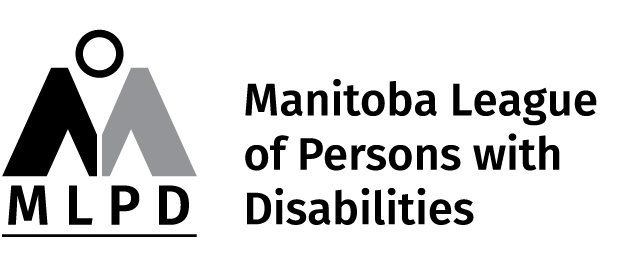Reflections from Disability Without Poverty
Lived experience of disability and gifts in the political process is an important and often neglected conversation. MLPD is expanding this conversation as part of a project with Elections Canada. Recently, our Executive Director, Melissa Graham, had the opportunity to interview Michelle Hewitt and Rabia Khedr from Disability Without Poverty (DWP). They spoke about their experiences working with elected officials and policy-makers towards the Canada Disability Benefit. The following is an edited version of that conversation.

Rabia Khedr, National Director of DWP
Rabia is the National Director of DWP. She is from Mississauga, Ontario. She describes herself as a person with a disability and a Brown woman who chooses to cover her hair. Rabia also describes herself as a Muslim Punjabi Pakistan Canadian woman who is Blind.

Michelle Hewitt, Chair of DWP
Michelle is the Chair of DWP. She lives in Kelowna, British Columbia. This is where she has lived for the past 18 years, prior to that she lived on the Island, but she was brought up in England. Michelle acquired multiple sclerosis 19 years ago and uses a power wheelchair full time. She is also a PhD candidate, and has a very cute dog.
Leaders in the Community
Michelle and Rabia acknowledge their privilege in being able to support the disability community. They also acknowledge that they do not come from privileged backgrounds, have experienced barriers, and come from working-class families. Additionally, Rabia experienced multiple barriers as a child immigrant. Both Michelle and Rabia see this work as a passion, and feel privileged to be able to use their education and experiences to support the community.
They decided to start DWP when the Canada Disability Benefit was announced in the 2020 Throne Speech. At the time, anti-poverty disability work was really taking off in British Columbia. They needed to build the organization rapidly to keep up with what was happening with the proposed benefit.
Both Michelle and Rabia feel that the most effective way to hold the government to their promise is to facilitate the active engagement and capacity-building of the disability community. They carried out research, conducted polls, held webinars, conducted online campaigns, and many other activities. They want to make sure that the views of people with disabilities across the country are being heard in the halls of Parliament and in the offices of all MPs and Senators.
From the beginning, DWP saw how important it is, in Michelle’s words, “(to) inform disabled people and our friends and allies so that they can advocate for themselves in the most effective way”. They encourage people with disabilities to get to know party platforms, start letter writing campaigns and e-petitions. DWP also encourages voters with disabilities to be involved in the electoral process across all parties.
The Benefits of Lived Experience
DWP starts with the approach that “disabled people living in poverty know what they need… They know where the accessibility hiccups are”. As Rabia put it, “when I walk in and meet with, you know, an able-bodied white man, the fact that I have a disability, I am racialized, I am visibly Muslim, all this stuff – he doesn’t expect me to talk to him the way I’m talking to him. And I can draw on my lived experience and talk about the reality of living with a disability and experiencing poverty … from firsthand accounts and real stories of the people that I support around me in the community work that I do”. When people with lived experience of disability are directly informing elected officials and policy makers about their experience, it leads to a better understanding of how those decisions impact real lives and genuine circumstances.
Michelle and Rabia noted that without the knowledge of people with lived experience, important data gets left out of the policy creation process. As Michelle said, “we purposely set out to reach people that are newcomers to Canada, refugees, racialized, LGBTQ2S+, and institutionalized”. They’re also setting up peer-lead interviews, understanding that sometimes it’s easier to talk to someone who has had the lived experience of poverty and knows how it can impact someone’s life.
Politicians without lived experience can fail to see what the barriers are when making policy decisions. For example, they may not understand the barriers that are created when a medical form is required to access a program. People living in poverty often have more barriers to accessing family doctors, are more likely to be charged a fee to have a form filled out, and are less likely to have a medical professional working with them that has a full understanding of their disability and its impacts.
As a person who acquired her disability, Michelle was sympathetic on this point. She reflected that before acquiring her disability she was an active ally to the community as a non-disabled person, but when she acquired her disability she realized how much she didn’t know before.
Building Capacity Through Education
One of the unique aspects of DWP is that they identified early on that civics education was also needed. They support disability communities to understand how bills become law and how to effectively work with policy makers. One of their most effective strategies was let people know that they could send mail to their Member of Parliament free of charge.
Michelle noted it’s important to remember the value of your vote. Your vote is a message to the candidate to represent your opinions, and to remember that you are the reason they have their job. She also felt that it was important for candidates to see the value of lived experience and make it easy for people with disabilities to share their knowledge – actually sitting with people and having conversations.
If you would like to know more about the work of Disability Without Poverty, please visit their website at https://www.disabilitywithoutpoverty.ca/
If you would like to hear more about Michelle and Rabia’s experiences, please join our webinar coming up in mid-February 2024.
